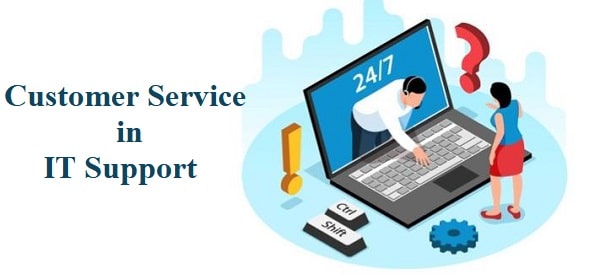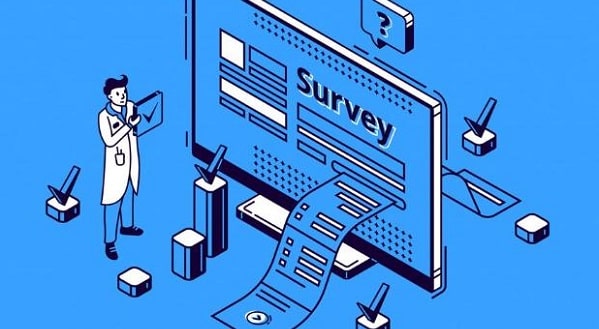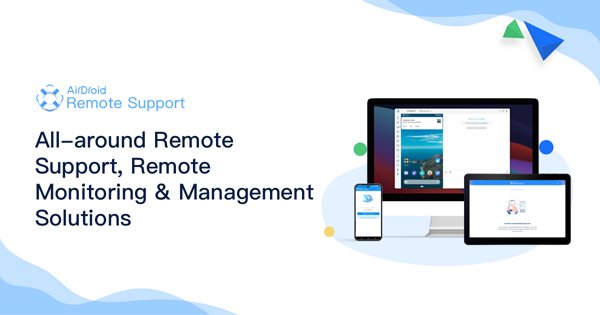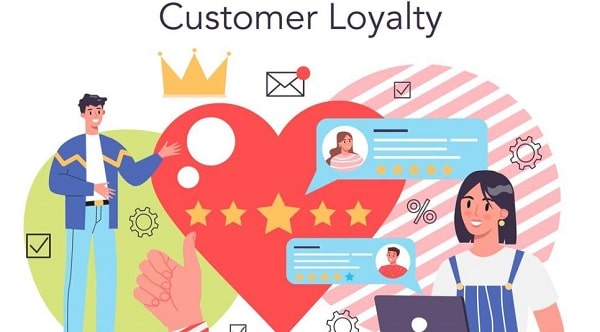Ultimate Guide to Providing Customer Service in IT Support
Customer service is the process of providing assistance and support to customers before, during, and after they purchase or use a product or service. It is essential for any business that wants to satisfy and retain its customers and build a positive reputation and brand image. However, customer service in IT support is different from common customer service.
IT support involves solving technical problems and issues customers may encounter when using software, hardware, or network systems. It requires specialized skills, knowledge, and tools to provide effective and efficient solutions to customers. In this guide, we will explore what customer service in IT support is and what it means to provide good customer service in IT support. Let's dive into the details.
Part 1: What Is Customer Service in IT Support
Customer service in IT support provides technical assistance and support to customers using IT products or services. It can be delivered through various channels, such as phone, email, chat, social media, or remote access. Customer service in IT support can also be categorized into different levels, such as first-level support, second-level support, or third-level support, depending on the complexity and severity of the issues.

Customer service in IT support differs from common customer service in several ways:
- Customer service in IT support requires more technical skills and knowledge than common customer service. IT support agents need to be familiar with the IT products or services they are supporting and the common issues and solutions.
- Customer service in IT support involves more troubleshooting and problem-solving than common customer service. IT support agents must be able to diagnose the root cause of the issues, provide clear and accurate instructions, and follow up until the issues are resolved.
- Customer service in IT support requires more patience and empathy than common customer service. IT support agents need to be able to deal with frustrated and angry customers and customers with different levels of technical proficiency and understanding.
Part 2: What Does Good Customer Service Mean in IT Support
Good customer service in IT support means providing timely, reliable, and satisfactory solutions to customers' technical issues, as well as exceeding their expectations and enhancing their satisfaction. It equates to providing customers with user-centered solutions, knowledgeable staff, detailed documentation, excellent ticketing systems, and extensive self-service options.
User-Centered Solutions
User-centered solutions are solutions tailored to each customer's specific needs and preferences. It considers the customer's technical level, device type, operating system, software version, network environment, and other factors affecting the issue and the solution. It also considers the customer's feedback, suggestions, and complaints and use them to improve the quality and usability of IT products or services.

Knowledgeable Staff
Knowledgeable staff have the technical skills and knowledge to provide effective and efficient solutions to customers' issues. They can communicate clearly and professionally with customers, using simple and understandable language, avoiding jargon and acronyms, and confirming the customer's understanding. They are also willing to learn new skills and knowledge, as well as to update and refresh their existing skills and knowledge to keep up with the changes and developments in the IT industry.
Detailed Documentation
Detailed documentation provides comprehensive and accurate information about the IT products or services and common issues and solutions. It can include user manuals, FAQs, troubleshooting guides, tutorials, videos, blogs, forums, and other resources to help customers find answers and solutions to their issues.
Excellent Ticketing System
An excellent ticketing system is a system that allows customers to report their issues, track their progress, and receive updates and notifications. IT support agents can manage and prioritize tasks, assign and escalate issues, and collaborate with other agents or teams. It can also provide analytics and reports that can help measure and improve the performance and efficiency of the IT support team.

Extensive Self-Service Options
Extensive self-service options allow customers to find and resolve their issues without contacting the IT support team. It can include chatbots, knowledge bases, online communities, and other tools to provide automated and instant responses and solutions to customer queries and issues.
Part 3: Best Practices for Providing Customer Service in IT Support
To provide good customer service in IT support, some best practices can be followed, such as:
Use Remote Support Software
Remote technical support is an IT support service that allows IT support agents to access and control a customer's device remotely without being physically present at the customer's location. If you need remote technical support for your customers, you can try AirDroid Remote Support. By using it, IT support agents can provide better customer service in IT support, as they can solve issues faster and easier, reduce costs and risks, and improve customer satisfaction and loyalty.

You can also enjoy other remote support features such as:
- Unattended Android Access: Under the unattended mode, you can connect and remote control a device without consent from the device end for maintenance purposes.
- AR Camera & 3D Marker: Allows you to see through the customers' device camera and guide your customers by placing 3D markers onto real-world objects.
- Tutorial Gesture: Swipe or tap on the shared screen, the tutorial gesture will appear on your customer's device. (Only available for Android devices)
- Live Chat via Voice Call and Voice/Text Message: Tackle and resolve complex issues by communicating directly with real-time voice chat and screen viewing. If the user is not available to take a call, you can communicate through voice messaging or text.
Enhance Customer Service Skills
Customer service skills are the skills that enable IT support agents to communicate and interact with customers effectively and professionally. It includes listening, empathy, patience, courtesy, clarity, positivity, and problem-solving. IT support agents should enhance their customer service skills by practicing and applying them in different scenarios and situations and by receiving feedback and coaching from managers and peers.
Provide Multi-Channel Customer Service
Multi-channel customer service provides customer service through various channels, such as phone, email, chat, social media, or remote access. It can increase the accessibility and convenience of the IT support team and cater to the customers' different preferences and needs. IT support agents should provide multi-channel customer service using the appropriate channel for each issue and customer.
Promote Self-Service Options
Self-service options allow customers to find and resolve their issues without contacting the IT support team. It can include chatbots, knowledge bases, online communities, and other tools that provide automated and instant responses and solutions to customer queries and issues. IT support agents should promote self-service options by informing and educating customers.

Set Up the SLA Policy
The SLA Policy is a policy that defines the expectations and standards of the IT support team, as well as the rights and responsibilities of the customers. It can include the scope, availability, response time, resolution time, escalation process, and IT support service performance metrics. IT support agents should set up the SLA Policy by consulting and negotiating with the customers.
Collect Customer Feedback
Customer feedback is the information and opinions that customers provide about the IT products or services and the IT support service. It can include ratings, reviews, surveys, comments, suggestions, and complaints. IT support agents should collect customer feedback by asking and encouraging customers to share their experiences and thoughts and using tools and platforms that can capture and analyze customer feedback.
Conduct Employee Training
Employee training is the process of providing and facilitating learning and development opportunities for the IT support team. It can include courses, workshops, webinars, certifications, and other resources that can enhance the skills and knowledge of the IT support agents. IT support agents should conduct employee training by assessing and addressing the training needs and gaps of the IT support team.

Leverage Automation
Automation is the use of technology and software to perform tasks and processes that are repetitive, routine, or time-consuming. It can include chatbots, scripts, macros, workflows, and other tools to automate and streamline the IT support service. IT support agents should leverage automation by identifying and implementing the tasks and processes that can be automated.
Part 4: The Impact of IT Customer Service on Business Development
IT customer service significantly impacts business development, as it affects the customer's perception, loyalty, and value, as well as the business's reputation, opportunities, and growth. IT customer service can have positive and negative impacts, depending on the quality and consistency of the service.
The Impact of Good Customer Service
Good customer service can bring many benefits to a business, such as:
Increase Brand Awareness and Sales
Good customer service can increase a business's brand awareness and sales, as it can generate positive word-of-mouth, referrals, and reviews from satisfied customers. Customers who receive good customer service are more likely to recommend IT products or services to their friends, family, and colleagues and share their experiences and opinions on social media and other platforms. This can increase the exposure and visibility of the business, as well as attract and convert more potential customers.
Enhance Customer Loyalty and Lifetime Value
Good customer service can enhance a business's customer loyalty and lifetime value, increasing the retention and repeat purchases of existing customers. Customers who receive good customer service are more likely to stay loyal and faithful to the IT products or services and purchase more or upgrade to higher plans or packages. This can increase the revenue and profitability of the business and reduce customer acquisition and retention costs.

Boost Employee Retention and Motivation
Good customer service can also boost employee retention and motivation in a business, as it can improve the work environment and culture of the IT support team. Employees who provide good customer service are more likely to receive positive feedback, recognition, and rewards from customers and managers and feel proud and satisfied with their work. This can increase the morale and engagement of the employees and reduce the turnover and absenteeism rates.
The Impact of Terrible Customer Service
Terrible customer service can also have many drawbacks for a business, such as:
Poor End-User Experience
Terrible customer service can result in a poor end-user experience, as it can cause frustration, dissatisfaction, and disappointment for the customers. Customers who receive terrible customer service are more likely to encounter unresolved or recurring issues, delayed or inaccurate responses, rude or unprofessional agents, and other problems affecting their usage and enjoyment of the IT products or services.
Declining Business Opportunities
Terrible customer service can also lead to declining business opportunities, as it can damage the reputation and image of the business. Customers who receive terrible customer service are more likely to complain, criticize, and warn others about the IT products or services and leave negative reviews and ratings on social media and other platforms. This can decrease the trust and credibility of the business and deter and lose more potential customers.

High Customer Churn Rate
Terrible customer service can also cause a high customer churn rate, as it can reduce the loyalty and value of the customers. Customers who receive terrible customer service are more likely to switch to competitors or alternatives and cancel or downgrade their plans or packages. This can decrease the revenue and profitability of the business and increase the customer acquisition and retention costs.
Conclusion
Effective customer service in IT support is crucial for business success. It requires a unique set of technical skills, patience, and empathy. Providing user-centered solutions, having knowledgeable staff, maintaining detailed documentation, implementing an excellent ticketing system, and offering extensive self-service options are key principles for delivering good customer service. Following best practices, including enhancing customer service skills and leveraging tools like AirDroid for remote technical support, can contribute to overall success in IT support.






Leave a Reply.